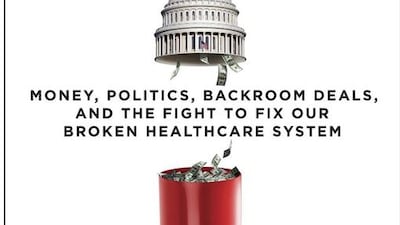Health care in the United States is a racket.
Steven Brill, the author of America's Bitter Pill: Money, Politics, Backroom Deals, and the Fight to Fix Our Broken Healthcare System, doesn't quite put it like that.
Instead, he highlights story after story of how bad insurance policies ruin lives by leaving families bankrupt while wrestling with terminal illness; how pharmaceutical companies extract stratospheric profit margins while hospitals prescribe too much care at prices unrelated to its cost; how hospital debt collection officers harass patients for money in the emergency room immediately before life-or-death heart surgery.
But what else is there to call an industry that systematically impoverishes its most vulnerable customers, with the full consent of the law, in exchange for what in other developed countries is a fundamental right? Where pharmaceutical companies, hospitals, medical device providers and insurance companies wield enough political influence to torpedo any reform that doesn’t offer them guaranteed increases in their bottom lines?
Brill’s book performs an admirable job of getting behind the scenes of the White House decision to tell us the story of the genesis and implementation of Obamacare. He combines this with more than enough of the two-a-penny accounts of victims of the US healthcare system – individuals who have been exploited in moments of need by companies whose putative raison d’être is to save and improve lives.
The vicissitudes of the US’s healthcare system have been well documented before Brill.
In combination with his reporting on Obamacare’s origins, passage and implementation, from Kentucky’s Kynect healthcare commerce platform, to Silicon Valley-inspired insurer Oscar, Brill shares his own harrowing experiences on the gurney as he was wheeled into New York Presbyterian Hospital for an operation to correct an aortic aneurysm.
Brill’s account is a fair, exhaustive, state-of-the-nation account of the broken US healthcare system and Obama’s partially successful attempt to heal it.
q&a a high price for good health
Adam Bouyamourn explains the intricacies of ObamaCare.
How does Obamacare work?
Under the Affordable Care Act, the US government requires everyone to have insurance, either through their employer or by purchasing it themselves (the individual mandate). The governme nt provides subsidies on insurance for families earning up to 400 per cent of the poverty line. Insurers can no longer bar individuals with pre-existing conditions.
What problems remain?
The government is forbidden from negotiating with pharmaceutical companies to buy cheaper drugs. Hospitals cannot import drugs from abroad, where they would be cheaper. The pharmaceutical industry won these concessions by threatening not to support the bill. They ensure supernormal profits for drug makers. Some families will be hit by high confiscation rates at the withdrawal of subsidy — where earning an additional $50 per year can result in cuts to government support of many thousands of dollars. Hospitals still have an incentive to overprescribe health care — especially now that their customers are more likely to be able to pay their bills. The bill contains a few measures to lower costs, but not enough to slow the rapid rates of health inflation.
What does Steven Brill want to see?
He proposes vertical integration between hospitals and insurers. He notes that this would reduce hospitals’ incentives to overcharge, and inability to get away with it by exploiting the information advantage they enjoy over insurance companies.
abouyamourn@thenational.ae
Follow The National's Business section on Twitter

